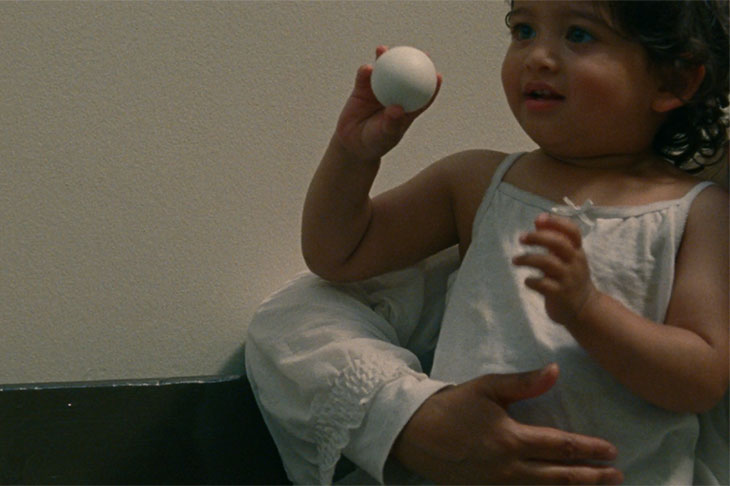‘But where did he come from, the little dark thing?’ In Emily Brontë’s Wuthering Heights, Heathcliff is a foundling, picked up – so the story goes – off the docks in Liverpool. Taken in by the Earnshaw family, he grows up on the Moors, volatile and solitary, a shade darker than everyone else. The great romance of his character stems from his lack of origin. Is he a monster, or the residue of events in an unknown past?
In Balls, a short film on display at the Foundling Museum, model-turned-filmmaker Lily Cole imagines Heathcliff’s beginning by intertwining his story with those of two young women who gave up their babies to the Foundling Hospital in the 19th century. The film, commissioned (in collaboration with the Brontë Parsonage Museum and Rapid Response Unit) to mark the 200th anniversary of Emily Brontë’s birth, is set in present-day Liverpool. Peggy and Mary Ann are two single mothers no longer able to support their children alone.
Balls (film still; 2018), Lily Cole. Image: © Eoin McLoughlin and Fury Films
Giving up their children is a traumatising process. The women are questioned by a male board of admissions, and must prove either that the child was born of rape (‘Was it repeated?’), or else conceived as the result of seduction after a promise of marriage. Peggy, Heathcliff’s mother (played by Tia Bannon), is asked if her child is black. ‘Are you kidding?’ she responds.
Once through the interview stage, the mothers are asked to pick a ball at random. This lottery, from which the film takes its title, was thought the fairest way to allocate places at the Foundling Hospital, which, by 1800, had already admitted 18,000 babies – a sign of London’s rapidly increasing birth rate. A white ball signified admission; a black ball, and the young mother was turned away; a red ball placed the child on a reserve list, given a place if another failed the health check. A particularly moving scene shows Mary Ann (Sarah Gadon) as her child is examined by doctors, the rash on its chest signalling her continued life of poverty and shame. Perhaps the bleakest truth about the Foundling Hospital was its inevitable failure to address the conditions of urban poverty.
Balls (film still; 2018), Lily Cole. Image: © Eoin McLoughlin and Fury Films
Cole’s use of the Foundling’s archive compellingly draws attention to the real women behind the characters. Adjacent to the film is a glass cabinet containing the letters written on behalf of Peggy and Mary Ann to explain the circumstances of their situations. Peggy was 14 when she was seduced on a voyage to England, by a man who left the ship at Ostend despite knowing she was pregnant. Her mistress petitions the Foundling on behalf of the ‘poor unfortunate girl’, who, illiterate, has signed the letter with her wavering mark. Mary Ann, meanwhile, was raped by a fellow servant (now presumed dead) in the house in which she worked; her mistress, like Peggy’s, vouches for her good conduct, writing that she ‘believes entirely the statement the petitioner has made regarding the paternity of the child and as to the manner of the occasion’.
The letters are as elliptical as the film itself. There was a language for the trauma experienced by women, if not by their lovers or abusers, then by a society that condemned pregnancy out of wedlock. In her sensitive handling of these archival stories, and by staging them in a contemporary setting, Cole juxtaposes past with present, asking her viewers to consider the progress of women’s rights in the last 200 years – and to recognise the distance still to go. Society still polices women’s bodies: in Northern Ireland, for example, women still do not have the right to decide not to be pregnant; to a lesser extent, though clearly retrogressive, a male member of the Brontë Society, which runs the museum, resigned in protest against Cole’s appointment as a ‘creative partner’, citing his opposition to her work as a model.
Balls (film still; 2018), Lily Cole. Image: © Eoin McLoughlin and Fury Films
Yet Balls is hopeful, too. As Peggy folds a token into her baby’s blanket – a small object that will identify him in the Foundling’s records; there are thousands of such tokens in the archive – we witness a forward-looking gesture, and one born out of a desire for a better life.
‘Lily Cole: Balls’ is at the Foundling Museum, London, until 2 December.
